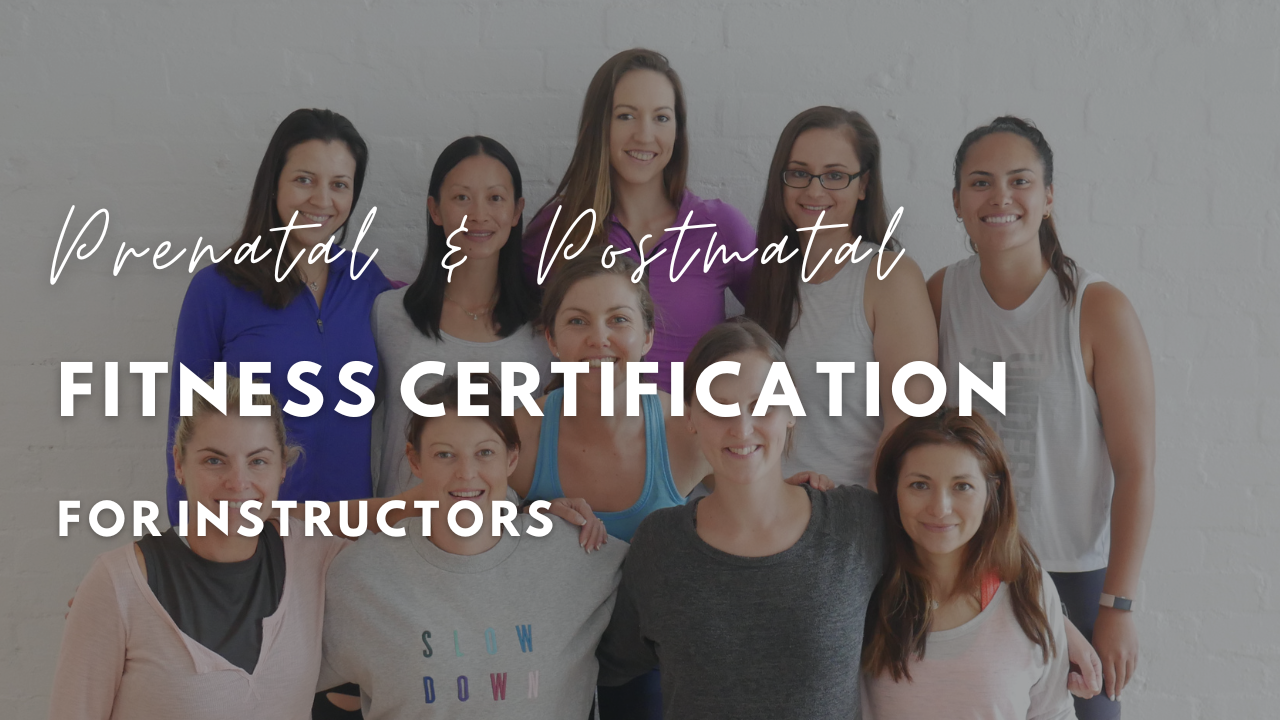Can I Do Strength Training while Pregnant?

Strength Training in Pregnancy
Yes! In most cases, you can (and should) do strength training while pregnant.
The American College of Obstetricians and Gynecologists (ACOG), CDC, and Royal College of Obstetricians all recommend 150 min/week of moderate exercise, including resistance training 2-3x/week, for healthy pregnancies.
Strength training is one of the BEST things you can do for an easier pregnancy, labor, and recovery. Start light, progress smart, and listen to your body.
Modifications
Strength training when pregnant requires some specific modifications.
When training, you increase the weight as you become stronger to increase the resistance as a way to keep challenging your muscles and increase your strength.
The American College of Obstetricians and Gynecologists states that strength training (resistance exercise) as safe during pregnancy.
Experts agree, so long as you first clear it with your healthcare provider and are not experiencing any pregnancy-related health conditions.
How to Strength Train
Training involves strengthening your muscles by lifting weights. Or you can do exercises by just using your own body weight. I recommend you try to do some muscle-strengthening activities twice a week.
If you have any pregnancy complications, speak to your doctor or midwife first. There are many strength training gym machines, pieces of fitness equipment, exercises, positions and movements that must be avoided when pregnant.
I want you to listen this podcast as we chat more on this topic.
That sore feeling you have after a workout is actually you slightly tearing the muscle. With proper rest, nutrition and time, it helps to rebuild the muscle.
Conditions Preventing You From Lifting Weights
1. Heart or lung disease
2. Cervical cerclage
3. Severe anemia
4. Chronic bronchitis
5. Intrauterine growth restriction
6. Poor diabetes control
7. Poor control of hypertension
8. Obesity
9. Preeclampsia
10. Placenta previa
11. Pregnancy with twins, triplets, or high-order multiples
Weight Training Exercises to AVOID
I want to start with what exercises you need to avoid when pregnant as this is the first step to keeping both you and baby safe.
There are some weight exercises that are not recommended when you're pregnant, so it's very important to talk to an expert at your gym or fitness center before you get started.
Exercise to Avoid:
1. Most total body circuit classes
2. Classes that use bar bells and fast movements
3. Cross-fit type training that involves ballistic movements using heavy weights.
4. Workouts that use heavy bar bells behind your neck after 12 weeks.
5. Avoid exercises such as deadlifts, clean and press, and upright rows.
6. Weighted sit-up or abdominal exercises that can cause unwanted strain on your core.
7. Abdominal rotation machines.
Safe Strength Training Guidelines
Do:
1. Use moderate weights (RPE 5-7/10)
2. Focus on form and control
3. Include full-body or split routines
4. 2-3 sets of 10-15 reps
5. Stop if dizzy, painful, or leaking
Don't:
1. Lift near-max (1-3 RM)
2. Do Valsalva (holding breath hard)
3. Perform overhead lifts lying flat after 16 weeks
4. Do contact sports, heavy plyometrics, or hot yoga
5. Ignore coning/doming of the belly (sign of core strain)
RED FLAGS - STOP and CALL YOUR DOCTOR
1. Vaginal bleeding
2. Severe headache/dizziness
3. Calf pain or swelling (DVT risk)
4. Regular painful contractions
5. Fluid gushing/leaking
6. Coning (ridge down midline when doing abs)
Strength Training Workout
This pregnancy strength workout will help you start off your pregnancy with safe prenatal exercises for back strengthening. These exercises are ideal for back strengthening.
This fully packed 20-minute first trimester workout will have you feeling strong, stable and energized throughout your entire pregnancy.
Designed specifically for first trimester, you can also do this in your 2nd trimester and 3rd trimesters once approved by your doctor.
Pregnancy Strength Training Workout Video
Why it's harder to exercise as you go through your pregnancy:
1. Increased blood volume, which means your heart has to work harder to pump it around your body.
2. Less space for your lungs to expand as baby grows bigger making it much harder to breathe.
3. The change in tension of your ligaments as the pregnancy hormone 'relaxin' literally relaxes them.
4. Fatigue as your body works overtime to create a little baby!
And so many more.
Now, if we look at this and then push hard to increase our weights, can you see that it might just all be too much?
And the other thing I'd like to ask you, is why?
Why stay with the your same weight training regime?
Is it so that you don't put on excess weight during your pregnancy?
Because you can recover more quickly post-pregnancy?
Maybe it's because that the type of exercise brings you happiness and you love it and don't want to miss out?
All very valid reasons!
So, here's the trick. You can still do weights (given you have the all clear from your health care professional).
But, my dear friend, ease off and don't go too hard.
There's a lot of changes happening and a lot of expansion.
If you are lifting heavy, there is a whole lot of weight pressing down to that lovely pelvic floor of yours.
I'm going to replace the words 'weight training' with 'strength training' because there is a difference. The focus doesn't need to be on how much weight you are lifting, it's about your strength.
Guidelines for Safe Strength Training
The approach to strength training can vary significantly as pregnancy progresses through each trimester.
In the first trimester, many women can continue their pre-pregnancy workout routines with minor adjustments for comfort and safety.
However, as they move into the second and third trimesters, modifications become increasingly important.
During these stages, women should avoid exercises that involve lying flat on the back or that might risk abdominal trauma.
It's also advisable to reduce the intensity and duration of workouts and to focus on maintaining rather than increasing muscle strength.
Use Correct Form
In each trimester, exercises should be performed with careful attention to form and breathing.
It's recommended to avoid heavy weights that strain the lower back and to use lighter weights with higher repetitions instead.
Stability balls and resistance bands can be great tools for providing support and resistance without the need for heavy weights.
Staying hydrated, avoiding overheating, and taking breaks as needed are additional guidelines that ensure safety throughout the pregnancy.
Strength Training Tips
1. Avoid lifting weights while lying on your back especially in 2nd and 3rd trimesters.
2. Don't over-exert yourself or strain too much.
3. Use an incline bench instead of a flat bench.
4. During the third trimester please be careful when lifting weight overhead.
5. Avoid lifting heavy weights.
6. Avoid holding your breath (known as the Valsalva maneuver)
7. Ask help from gym staff about technique.
Modify Strength Training
As pregnancy advances, the body undergoes significant changes that necessitate modifications to strength training routines.
During the second trimester, women may need to adjust their stance during exercises like squats or lunges to account for changes in balance.
They should also be cautious about engaging in activities that involve sudden movements or the risk of falling.
Your Third Trimester
In the third trimester, the focus should shift more towards gentle stretching and strengthening exercises that don't put pressure on the abdomen or require lying flat on the back.
It's also essential to monitor heart rate and exertion levels during workouts.
Pregnant women should be able to carry on a conversation while exercising, indicating a safe level of exertion.
Breathing should not be labored, and exercises that cause any pain or discomfort should be discontinued immediately.
A certified prenatal fitness instructor can provide valuable guidance on how to safely modify exercises and can suggest alternatives that are better suited for later stages of pregnancy.
Can I do strength training while pregnant?
Yes, as already discussed strength training is beneficial when pregnant but you know the best exercise to do and which ones you must avoid.
Why is strength training recommended?
1. Help to avoid aches and pains as your body grows.
2. Physically prepare your body for labor.
3. Prepare your body for life as a new mother. Lifting, carrying and pram-pushing!
When to stop lifting weights when pregnant?
First piece of advice is you should definitely stop if you feel any pain, strain or shortness of breath when lifting.
Exerting yourself too much may increase your risk of preterm delivery.
As you progress deeper into your pregnancy your workouts must be modified which you will see with my trimester-specific workouts.
Related: Pregnancy workouts at home
Are deadlifts OK?
Some women have continued to perform deadlifts when pregnant but I am not a fan. The stress on your overall body can cause injury especially when your hormones kick in.
There are just much better ways to strength train besides doing risky deadlifts without any form of modification.
What shouldn't I lift?
Avoid lifting heavy weights and try and avoid barbells or exercises over your head. There are many exercises you need to avoid which are already listed in this post.
Max weight I can lift?
This is always an individual question and answer as every person is different. What I would say here is that you should not heavy weights or try to perform sets to exhaustion.
Now is not the time to try and achieve personal bests.
Can I do squats?
Modified squats are safe for most pregnant women because they can help strengthen your pelvic floor muscles, improve hip mobility and improve blood circulation to your whole body.
Related article: Can I do squats when pregnant?
Can I do bench press while pregnant?
The key point here is to avoid lifting weights while lying on your back after the first 12 weeks of your pregnancy.
Because of that reason, you should avoid the bench press and use some of the many other safe pregnancy exercises to strengthen the chest and arms.
One machine could be the chest fly machine.
Can I do lunges?
Lunges are a great exercise to do throughout pregnancy as they can help with balance and stabilization.
Can you do leg lifts?
Leg lifts are another good exercise to strengthen your back and abdominal muscles. As with a lot of exercises, your leg lifts must be modified to avoid lying on your back as you progress into your pregnancy.
Can you do jumping jacks?
I wouldn't advise you do any bouncing, jumping or ballistic movements and this includes jumping jacks. There is just no need to do this exercises as there are so many other safer options.
Can I do sit ups?
I have written an entire post on ab training when pregnant with the link below so i won't go into it in depth here.
While sit-ups during pregnancy may not a safety risk for your baby, they may be risky for you as they can contribute to diastasis recti or uterine prolapse.
Are glute bridges OK?
Modified bridges can be performed during pregnancy because they can help to develop stronger glutes help to alleviate low back and pelvic pain.
Can you do side plank when pregnant?
I do not like planking when pregnant especially when pregnant for so many reasons. An alternative is doing the side plank.
They are a great way to strengthen your core and do not increase your risk of diastasis recti.
Could lifting big heavy weights have a detrimental affect on your body putting more pressure on your pelvic floor and potentially increasing your risk of injury?
Yes.
Am I going to talk you through when and how to incorporate some strength training into your routine so that you can get those feel good endorphins, you can be fit, healthy and strong through your pregnancy and you can aid in your recovery post-birth?
Yes - let's get into that now.
When
There's a certain skill that you need to ensure you learn in your pregnancy. It’s the most important skill you will ever need and it will help you through your pregnancy.
Want to know what it is?
It's listening to your body. Every woman is different. Every pregnancy is different.
Your fitness levels before pregnancy, how you've been feeling through your first trimester, how you feel right now. It all plays a part.
There is no one rule.
At 10 weeks you can lift this much, but at 20 weeks you can only lift this much. For every woman it is different and I can't stress that enough.
I will bring you back to that thought about your pelvic floor though!
So my dear, I'm not going to tell you WHEN to start or stop exercising.
Listen to this Strength Training Podcast (12 minutes)
You need to:
a. listen to your health care professional as they can evaluate your individual situation.
b. you need to listen to your body.
I always tend to go on the side of caution, because it's not worth the risk. But staying healthy and active is so important and strength training is an important component of that.
How
So Kerryn how do I safely incorporate strength training into my pregnancy I hear you say? I'm glad you asked this question.
Let's get right into it now.
If you want to optimize your health through out your pregnancy there are four components to include in your week.
1. Walk, swim.
2. Stretch, we get tight, not over stretching, but I'm going to cover that in a whole other podcast so keep an eye out for it.
3. Release, massage, myofascial release
4. Strength body weight, light weights, resistance band.
What I am saying is, there is SO much choice.
The reason I started PregActive was because I was tired of women getting told 'oh you can't do this.'
And don't do that.
And basically sitting in a normal group fitness class feeling like they couldn't do more than half the class.
The good news is there is SO much you CAN do. So let's focus on that.
The main component is to enjoy it.
And I mean it.
You don't need to grit your teeth and push through anything you don’t like, because chances are, it's not going to be great for you or your baby.
You can get a burn in your workouts, but you don’t want it to fatigue you for days to come.
You can work out at your own pace, but make sure you have good ventilation, you stop regularly for drink breaks, you don't overdo it and you adjust week by week and remember it's your body that is changing.
Listen to Your Body
Listen to your body as well, if you have aches or pains don't push through. It’s your body communicating with you.
I could sit here for hours talking you through all the exercises you can do, but instead I'm going to give you a free workout.
One you can do at home that will help your back strength, your core, your legs and, we'll give you an overall body workout.
And you don't need anything but a water bottle.
Head over to the show notes and you'll see a link for it there. Now, I've included beginner, intermediate and advanced workouts in our program.
Because there are different levels of fitness for all pregnant women and not one workout will fit all!
When focusing on your strength training, you want to really focus on your postural based muscles.
This includes your:
1. Back strength
2. Glute strength
3. Core strength - no planks, no sit up ladies. I have a whole podcast coming as to why so stay tuned.
4. And then leg and arm strength is of great benefit.
Be efficient with your prenatal workouts and do compound exercises where you're using more that one body part at a time.
A great example of this is a lateral raise combined with a squat.
This is where some light weights can come in handy, and if your legs fatigue take out the squats and if your arms fatigue, take out the lateral raise.
Remember, each week of your pregnancy listen to your body.
Resistance Bands and Strength Training when Pregnant
I love using resistance bands as they provide constant 'resistance' throughout the exercise motion.
If you are looking to buy one; you need to be aware that different colors represent different tensions so aim for the lower resistance.
As with lifting weights, it is important to ensure you are using the correct technique so always seek advice from a trainer and let them know that you're pregnant.
Strength Training when Pregnant Myths
'Lifting makes baby small' - No evidence - strength training improves birth outcomes.
'You'll hurt the baby' - Baby is protected by amniotic fluid and strong uterus.
'Core work = diastasis' - Wrong exercises cause it. Bird-dogs, heel slides heal it.
In Summary
Ask yourself why you want to lift weights?
And if you can incorporate strength training with either lighter weights, resistance bands or no weights instead?
Listen to your body as to when it feels okay for you, and always ask your health care professional if you have questions
Take my years of expertise in designing pregnancy workouts and trust me on how you can incorporate some safe and effective exercise into your week.
Frequency is the key too!
Once a week is great but aim for 15- 20 minutes of strength 3 times a week if you can and walk somewhere most days.
We'd love to hear from you with your questions and feedback on this podcast.
We are here to deliver you with the information you need so you can be empowered, informed and confident in your pregnancy.
Benefits of Strength Training
Strength training during pregnancy can offer numerous benefits, including improved muscle tone, reduced back pain, and increased stamina for labor and delivery.
It can also help women maintain a healthy weight and recover more quickly postpartum.
Additionally, strength exercises can improve posture and provide mental health benefits by reducing stress and enhancing mood.
It's essential, however, for pregnant women to understand the right way to approach strength training to maximize these benefits while minimizing risk.
Chat to Your Doctor
Consultation with a healthcare provider is a crucial first step before starting any exercise regimen during pregnancy.
Once cleared, women can engage in strength training exercises that help maintain muscle strength, improve balance, and prepare their bodies for the physical demands of motherhood.
It's also important to listen to the body's signals and adjust workouts accordingly, as what may have been a moderate routine pre-pregnancy could become strenuous during pregnancy.
Tips for Staying Motivated and Safe While Strength Training
Staying motivated to continue strength training during pregnancy can be challenging, especially as the body changes and energy levels fluctuate.
Setting realistic goals and creating a routine can help, as can having a workout buddy or joining a prenatal exercise class for support and camaraderie.
It's also important to celebrate small victories and recognize the effort it takes to stay active during this transformative time.
Safety should always be the top priority.
So listening to the body and adjusting the workout intensity as needed is key. Wearing comfortable, supportive clothing and footwear can improve comfort and performance.
Finally, keeping a workout journal can help pregnant women track their progress and stay motivated throughout their pregnancy journey.
By following these tips and the guidance of qualified prenatal fitness trainers, pregnant women can enjoy the benefits of strength training safely.







